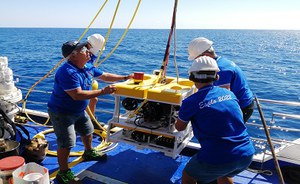ISPRA and the RAMOGE 2022 Oceanographic Campaign - First important results in the study of biodiversity and anthropogenic pressures on canyons and submerged rocky outcrops of the Ligurian Sea
On Wednesday 7 September, the ISPRA research vessel "Astrea" started the RAMOGE 2022 oceanographic campaign from the port of Savona, for the study of the deep environments of France, the Principality of Monaco and Italy, the countries that have signed the RAMOGE Agreement. This new initiative follows the experiences of the two previous RAMOGE campaigns, conducted respectively in 2015, with "Astrea", and in 2018, on board the French research ship "L’Atalante" of IFREMER.
The RAMOGE 2022 campaign aims to study some deep sites of great ecological interest but still unexplored, because it is essential to deepen our knowledge of these habitats, to promote their protection and to assess the impact of human activities, starting from accumulation of waste.
It is planned to investigate two sites in Italy, one in Monaco and two in France.
The research staff participating in this year's campaign belong to the following institutions of the three countries of the Agreement:
- for Italy: ISPRA and the University of Genova
- for France: French Biodiversity Agency, IFREMER, GIS Posidonie
- for the Principality of Monaco: Directorate of the Environment and Science Center of Monaco
The RAMOGE agreement, once the group of scholars will have to processed the data collected, will promote specific initiatives to appropriately enhance the results in order to encourage initiatives for the conservation of biodiversity in the area and the fight against pollution.
The campaign was made possible by the use of the Perseo ROV, supplied by ISPRA, and managed by the Section for "technological development and support for monitoring and research applied to the deep marine environment"; the ROV was recently upgraded following a structural modernization of the machine.
With great satisfaction, the new Perseus is able to operate up to -1000 meters deep, a record for ISPRA at a national level and an important achievement for researchers engaged in the exploration of the deep marine environment.



